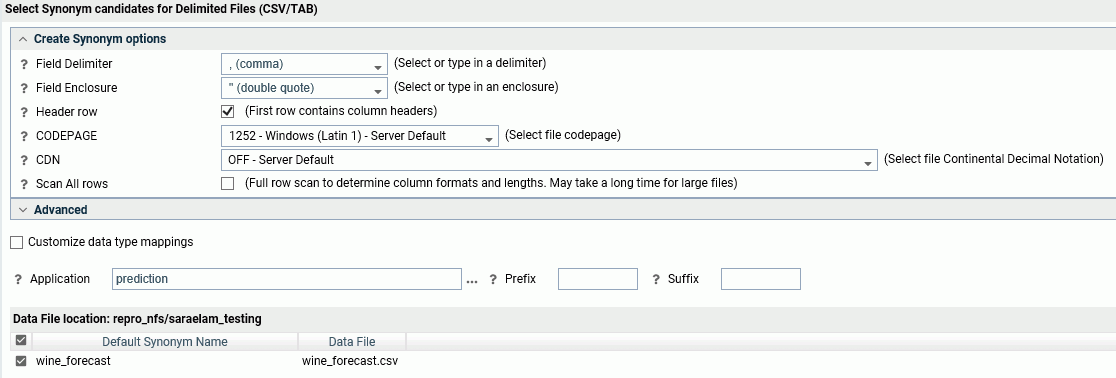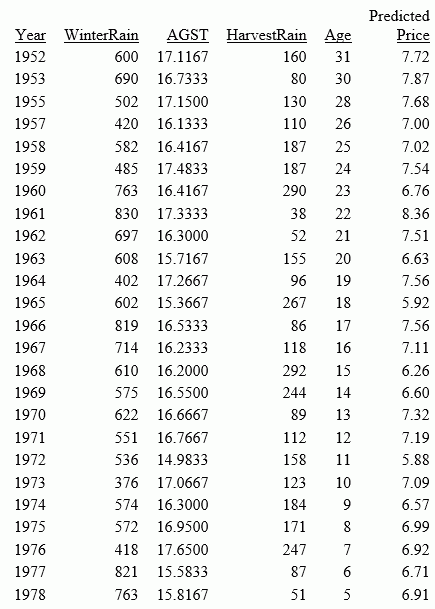Creating a Synonym for an R Script
|
Topics: |
Each R script used with the Adapter for Rserve must have a synonym that describes the independent variables and dependent variable of the script. The Master File will contain the list of input (independent) variables and the output (dependent) variable. The Access File will contain information about the script and data files.
The synonym will be created using a sample file that contains only the fields that are input parameters for the script. A few rows of sample data are sufficient for the Adapter for Rserve to determine the appropriate data types and lengths of the parameters. The sample file must be a .csv file.
To create a synonym for an R script, right-click a connection for the Adapter for Rserve and click Create metadata objects. The Create Synonym for Rserve page opens, as shown in the following image, where the connection name is MyRserve.

Select or enter values for the following parameters.
- R Script location on R server
-
Is the remote location, including script name and extension, for the R script file (.R). Leave blank if the R script is in an application folder accessible to the Reporting Server.
Note: In order to change a previously selected R script, you must delete the name of the file or the entire path before clicking the browse button.
- Select file with sample input data for the R Script
-
Open the file picker (...) to select the application directory and file that contains the sample data for creating the synonym. Click OK.
- Application
-
Open the file picker (...) to select the application that contains the R script. Select the R script file from the file picker and click OK.
- Synonym Name
-
Enter a name for the resulting synonym, or accept the default name.
When you have finished entering the synonym creation parameters, click Create Synonym on the ribbon, as shown in the following image.

When you use the RSERVE function to run an R script from a WebFOCUS report or chart, the name and application location of this synonym will be passed as the first argument to the function. The other arguments will be the names of the independent variables and the dependent variable. For more information, see the Using Functions manual.
Sample Session: Creating a Synonym for an R Script and Running the Script
The following R script named wine_run_model.R predicts Bordeaux wine prices based on the average growing season temperature, the amount of rain during the harvest season, the amount of rain during the winter, and the age of the wine.
# filename: wine_run_model.r
args <- commandArgs(trailingOnly=TRUE)
input_file <- file.path(args[1])
output_file <- file.path(args[2])
wine_test <- read.csv(input_file)
wine_model <- readRDS('/prediction/wine_model.rds')
results <- predict(wine_model, newdata = wine_test)
results <- as.data.frame(results)
colnames(results) <- c('Price')
write.csv(results, file=output_file, row.names=FALSE)
The following sample data file named wine_input_sample.csv contains the names and sample values for the independent variables used in this model.
"AGST","HarvestRain","WinterRain","Age" 16.1667,122,717,4 16,74,578,3
The synonym creation page for this script is shown in the following image.

Clicking Create Synonym on the ribbon generates the wine_run_model synonym. The Master File, wine_run_model.mas, describes the independent (input) variables and the dependent (output) variable, as shown below:
FILENAME=WINE_RUN_MODEL, SUFFIX=RSERVE , $
SEGMENT=INPUT_DATA, SEGTYPE=S0, $
FIELDNAME=AGST, ALIAS=AGST, USAGE=D9.4, ACTUAL=STRING,
MISSING=ON,
TITLE='AGST', $
FIELDNAME=HARVESTRAIN, ALIAS=HarvestRain, USAGE=I11, ACTUAL=STRING,
MISSING=ON,
TITLE='HarvestRain', $
FIELDNAME=WINTERRAIN, ALIAS=WinterRain, USAGE=I11, ACTUAL=STRING,
MISSING=ON,
TITLE='WinterRain', $
FIELDNAME=AGE, ALIAS=Age, USAGE=I11, ACTUAL=STRING,
MISSING=ON,
TITLE='Age', $
SEGMENT=OUTPUT_DATA, SEGTYPE=U, PARENT=INPUT_DATA, $
FIELDNAME=PRICE, ALIAS=Price, USAGE=D18.14, ACTUAL=STRING,
MISSING=ON,
TITLE='Price', $
The Access File, wine_run_model.acx, describes the names and locations of the R script and the sample data file, as shown below.
SEGNAME=INPUT_DATA, CONNECTION=MyRserve, R_SCRIPT=/prediction/wine_run_model.r, R_SCRIPT_LOCATION=WFRS, R_INPUT_SAMPLE_DAT=prediction/wine_input_sample.csv, $
Now that the synonym has been created for the model, the model will be used to run against the following data file named wine_forecast.csv.
Year,Price,WinterRain,AGST,HarvestRain,Age,FrancePop 1952,7.495,600,17.1167,160,31,43183.569 1953,8.0393,690,16.7333,80,30,43495.03 1955,7.6858,502,17.15,130,28,44217.857 1957,6.9845,420,16.1333,110,26,45152.252 1958,6.7772,582,16.4167,187,25,45653.805 1959,8.0757,485,17.4833,187,24,46128.638 1960,6.5188,763,16.4167,290,23,46583.995 1961,8.4937,830,17.3333,38,22,47128.005 1962,7.388,697,16.3,52,21,48088.673 1963,6.7127,608,15.7167,155,20,48798.99 1964,7.3094,402,17.2667,96,19,49356.943 1965,6.2518,602,15.3667,267,18,49801.821 1966,7.7443,819,16.5333,86,17,50254.966 1967,6.8398,714,16.2333,118,16,50650.406 1968,6.2435,610,16.2,292,15,51034.413 1969,6.3459,575,16.55,244,14,51470.276 1970,7.5883,622,16.6667,89,13,51918.389 1971,7.1934,551,16.7667,112,12,52431.647 1972,6.2049,536,14.9833,158,11,52894.183 1973,6.6367,376,17.0667,123,10,53332.805 1974,6.2941,574,16.3,184,9,53689.61 1975,7.292,572,16.95,171,8,53955.042 1976,7.1211,418,17.65,247,7,54159.049 1977,6.2587,821,15.5833,87,6,54378.362 1978,7.186,763,15.8167,51,5,54602.193
The data file can be any type of file that R can read. In this case it is another .csv file. This file needs a synonym in order to be used in a report request.
The following image shows the synonym creation page for wine_forecast.csv using the Adapter for Delimited Files.

The following is the generated Master File, wine_forecast.mas.
FILENAME=WINE_FORECAST, SUFFIX=DFIX , CODEPAGE=1252,
DATASET=prediction/wine_forecast.csv, $
SEGMENT=WINE_FORECAST, SEGTYPE=S0, $
FIELDNAME=YEAR1, ALIAS=Year, USAGE=I6, ACTUAL=A5V,
MISSING=ON, TITLE='Year', $
FIELDNAME=PRICE, ALIAS=Price, USAGE=D8.4, ACTUAL=A7V,
MISSING=ON, TITLE='Price', $
FIELDNAME=WINTERRAIN, ALIAS=WinterRain, USAGE=I5, ACTUAL=A3V,
MISSING=ON, TITLE='WinterRain', $
FIELDNAME=AGST, ALIAS=AGST, USAGE=D9.4, ACTUAL=A8V,
MISSING=ON, TITLE='AGST', $
FIELDNAME=HARVESTRAIN, ALIAS=HarvestRain, USAGE=I5, ACTUAL=A3V,
MISSING=ON, TITLE='HarvestRain', $
FIELDNAME=AGE, ALIAS=Age, USAGE=I4, ACTUAL=A2V, MISSING=ON, TITLE='Age', $
FIELDNAME=FRANCEPOP, ALIAS=FrancePop, USAGE=D11.3, ACTUAL=A11V,
MISSING=ON, TITLE='FrancePop', $The following is the generated Access File, wine_forecast.acx.
SEGNAME=WINE_FORECAST, DELIMITER=',', ENCLOSURE=", HEADER=YES, CDN=COMMAS_DOT, CONNECTION=<local>, $
The following request, wine_forecast_price_report.fex, uses the RSERVE bulit-in function to run the script and return a report.
-*wine_forecast_price_report.fex
TABLE FILE PREDICTION/WINE_FORECAST
PRINT
YEAR
WINTERRAIN
AGST
HARVESTRAIN
AGE
COMPUTE PREDICTED_PRICE/D18.2 MISSING ON ALL=
RSERVE(prediction/wine_run_model, AGST, HARVESTRAIN, WINTERRAIN, AGE, Price);
AS 'Predicted,Price'
ON TABLE SET PAGE NOLEAD
ON TABLE SET STYLE *
GRID=OFF,$
ENDSTYLE
END
The output is shown in the following image.

| WebFOCUS | |
|
Feedback |